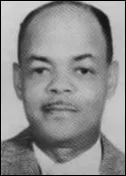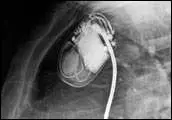BLACK HISTORY MONTH: Otis Boykin - Does a Heart GOOD
Not too many people know this highly-intelligent inventor & lifesaver:
Otis Boykin
His breakthroughs with resistors lead to the controlling unit for the pacemaker.
Read more about him below!
Link courtesy of BlackInventor.com
=============
 Otis F. Boykin was born on August 29, 1920
in Dallas, Texas. After graduating high school, he attended Fisk
College in Nashville, Tennessee. He graduated in 1941 and took a job as a
laboratory assistant with the Majestic Radio and TV Corporation in
Chicago, Illinois. He undertook various tasks but excelled at testing
automatic aircraft controls, ultimately serving as a supervisor. Three
years laster he left Majestic and took a position as a research engineer
with the P.J. Nilsen Reseach Laboratories. Soon thereafter, he decided
to try to develop a business of his own a founded Boykin-Fruth,
Incorporated. At the same time, he decided to continue his education,
pursuing graduate studies at the Illinois Institute of Technology in
Chicago, Illinois. He attended classes in 1946 and 1947 but was forced
to drop out because he lacked the funds to pay the next year’s tuition.
Otis F. Boykin was born on August 29, 1920
in Dallas, Texas. After graduating high school, he attended Fisk
College in Nashville, Tennessee. He graduated in 1941 and took a job as a
laboratory assistant with the Majestic Radio and TV Corporation in
Chicago, Illinois. He undertook various tasks but excelled at testing
automatic aircraft controls, ultimately serving as a supervisor. Three
years laster he left Majestic and took a position as a research engineer
with the P.J. Nilsen Reseach Laboratories. Soon thereafter, he decided
to try to develop a business of his own a founded Boykin-Fruth,
Incorporated. At the same time, he decided to continue his education,
pursuing graduate studies at the Illinois Institute of Technology in
Chicago, Illinois. He attended classes in 1946 and 1947 but was forced
to drop out because he lacked the funds to pay the next year’s tuition.
Despite
this setback, Boykin realized that a Masters Degree was not a
pre-requisite for inventive competence. He set out to work on project
that he had contemplated while in school. Otis BoykinAt the time, the
field of electronics was very popular among the science community and
Boykin took a special interest in working with resistors. A resistor is
an electronic component that slows the flow of an electrical current.
This is necessary to prevent too much electricity from passing through a
component than is necessary or even safe. Boykin sought and received a
patent for a wire precision resistor on June 16, 1959. This resistor
allowed for a specific amounts of current to flow through for a specific
purpose and would be used in radios and televisions. Two years later,
he created another resistor that could be manufactured very
inexpensively. It was a breakthrough device as it could withstand
extreme changes in temperature and tolerate and withstand various levels
of pressure and physical trauma without impairing its effectiveness.
The chip was cheaper and more reliable than others on the market. Not
surprisingly, it was in great demand as he received orders from consumer
electronics manufacturers, the United States military and electronics
behemoth IBM.
 In
1964, Boykin moved to Paris, creating electronic innovations for a new
market of customers. Most of these creations involved electrical
resistance components (including small component thick-film resistors
used in computers and variable resistors used in guided missile systems)
but he also created other important products including a chemical air
filter and a burglarproof cash register. His most famous invention,
however, was a control unit for the pacemaker, which used electrical
impulses to stimulate the heart and create a steady heartbeat. In a
tragic irony, Boykin died in 1982 as a result of heart failure.
In
1964, Boykin moved to Paris, creating electronic innovations for a new
market of customers. Most of these creations involved electrical
resistance components (including small component thick-film resistors
used in computers and variable resistors used in guided missile systems)
but he also created other important products including a chemical air
filter and a burglarproof cash register. His most famous invention,
however, was a control unit for the pacemaker, which used electrical
impulses to stimulate the heart and create a steady heartbeat. In a
tragic irony, Boykin died in 1982 as a result of heart failure.
Otis Boykin proved that the setback of having to drop out of school was not enough to deter him from his dream of becoming an inventor and having a long-lasting effect on the world.
More to come...
Otis Boykin
His breakthroughs with resistors lead to the controlling unit for the pacemaker.
Read more about him below!
Link courtesy of BlackInventor.com
=============
Otis Boykin
 Otis F. Boykin was born on August 29, 1920
in Dallas, Texas. After graduating high school, he attended Fisk
College in Nashville, Tennessee. He graduated in 1941 and took a job as a
laboratory assistant with the Majestic Radio and TV Corporation in
Chicago, Illinois. He undertook various tasks but excelled at testing
automatic aircraft controls, ultimately serving as a supervisor. Three
years laster he left Majestic and took a position as a research engineer
with the P.J. Nilsen Reseach Laboratories. Soon thereafter, he decided
to try to develop a business of his own a founded Boykin-Fruth,
Incorporated. At the same time, he decided to continue his education,
pursuing graduate studies at the Illinois Institute of Technology in
Chicago, Illinois. He attended classes in 1946 and 1947 but was forced
to drop out because he lacked the funds to pay the next year’s tuition.
Otis F. Boykin was born on August 29, 1920
in Dallas, Texas. After graduating high school, he attended Fisk
College in Nashville, Tennessee. He graduated in 1941 and took a job as a
laboratory assistant with the Majestic Radio and TV Corporation in
Chicago, Illinois. He undertook various tasks but excelled at testing
automatic aircraft controls, ultimately serving as a supervisor. Three
years laster he left Majestic and took a position as a research engineer
with the P.J. Nilsen Reseach Laboratories. Soon thereafter, he decided
to try to develop a business of his own a founded Boykin-Fruth,
Incorporated. At the same time, he decided to continue his education,
pursuing graduate studies at the Illinois Institute of Technology in
Chicago, Illinois. He attended classes in 1946 and 1947 but was forced
to drop out because he lacked the funds to pay the next year’s tuition. In
1964, Boykin moved to Paris, creating electronic innovations for a new
market of customers. Most of these creations involved electrical
resistance components (including small component thick-film resistors
used in computers and variable resistors used in guided missile systems)
but he also created other important products including a chemical air
filter and a burglarproof cash register. His most famous invention,
however, was a control unit for the pacemaker, which used electrical
impulses to stimulate the heart and create a steady heartbeat. In a
tragic irony, Boykin died in 1982 as a result of heart failure.
In
1964, Boykin moved to Paris, creating electronic innovations for a new
market of customers. Most of these creations involved electrical
resistance components (including small component thick-film resistors
used in computers and variable resistors used in guided missile systems)
but he also created other important products including a chemical air
filter and a burglarproof cash register. His most famous invention,
however, was a control unit for the pacemaker, which used electrical
impulses to stimulate the heart and create a steady heartbeat. In a
tragic irony, Boykin died in 1982 as a result of heart failure.Otis Boykin proved that the setback of having to drop out of school was not enough to deter him from his dream of becoming an inventor and having a long-lasting effect on the world.
More to come...

0 Comments:
Post a Comment
<< Home